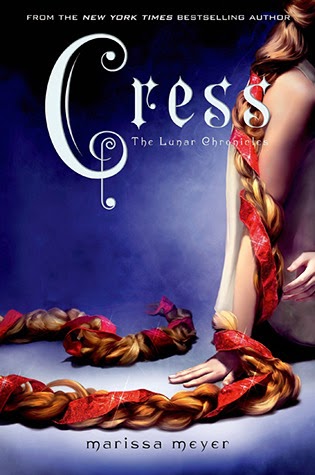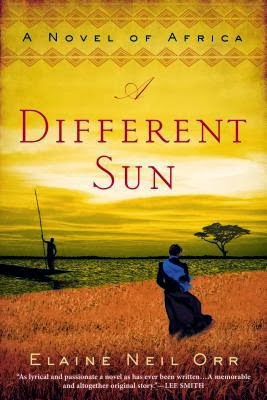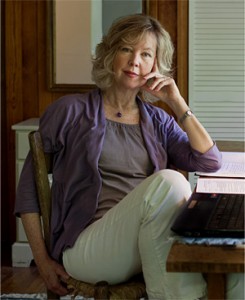Author: Marissa Meyer
Genre: young adult, retellings, science fiction, mythic fiction
Series: The Lunar Chronicles #3
Pages: 560 (ARC edition)
Published: February 4 2014
Source: ARC from Macmillan
Rating: 5/5
Rapunzel’s tower is a satellite. She can’t let down her hair—or her guard.
In this third book in the bestselling Lunar Chronicles series, Cinder and Captain Thorne are fugitives on the run, with Scarlet and Wolf in tow. Together, they’re plotting to overthrow Queen Levana and her army.
Their best hope lies with Cress, who has been trapped on a satellite since childhood with only her netscreens as company. All that screen time has made Cress an excellent hacker—unfortunately, she’s just received orders from Levana to track down Cinder and her handsome accomplice.
When a daring rescue goes awry, the group is separated. Cress finally has her freedom, but it comes at a high price. Meanwhile, Queen Levana will let nothing stop her marriage to Emperor Kai. Cress, Scarlet, and Cinder may not have signed up to save the world, but they may be the only ones who can.
Cress is another one of those books; the ones that demand to be talked about IN CAPS when you read them. The ones that result in flails and feels and gifs and exclamatory declarations of This Book Broke My Brain Syndrome. (As Bekka from Great Imaginations said: "Such wow. Very good. Much book. Thorne. Go buy.") Cress is a book that reaches out from the page and grabs your attention, and despite that 560 page length never lets go of your imagination. Even when you know the basics of the story being told, it cannot and will not be ignored. Under Marissa Meyer's skilled pen and ever-growing talent, the latest installment in the Lunar Chronicles is the best of them all.
There's a lot to enjoy about every subsequent novel in Meyer's reinterpreted fairytale series. First, foremost and my favorite: there's the diverse core cast of strong, different, interesting female characters to pick favorites from among. There's Cinder, adapting to a new role and wrestling with her past while trying to save her people and the man she loves, there's Scarlet and her badassery and her mysterious past and her conflicting feelings about love, and finally Meyer introduces the character of Cress, who is a wholly different kind of brave but who manages to be silly and smart, goofy and loyal. No matter which girl ends up resonating with the reader more, it's hard not to like every lead Meyer has crafted. They feel real and you care about what happens to each of them. Cress is no different in that she is defined, flawed, and wholly her own person. Though both Cinder and Scarlet have their own, rather more minor storylines here in the third book, it's the newcomer's story that really stands out above the rest.
In addition, the romances are swoony, no matter which ship(s) you decide to board. As a group, the male leads are well-drawn and interesting on a sliding scale (with Thorne being the most interesting and complex and Wolf the least, with Kai solidly in the middle), but I can't deny I ship each with a respective female counterpart. I liked the development that Thorne underwent especially -- it was an atypical plot/character progression for a YA male love interest while still being completely in tune with the original Rapunzel myth. Meyer keeps an even hand on the various romances being developed versus actual plot progression; applying just enough of the former to help speed along the latter. Fan (and one of my personal) favorite Iko is back, too, and Meyer tosses her some of the best lines and moments in the book. Though Cress isn't afraid to go a bit dark, there are some genuine lighter moments that made me smile at my book all the while fearing for how it would all play out.
As a small aside that must be noted: Not since Roar and Aria have I enjoyed a friendship as much as I do the relationship between Cinder and Thorne. My ship for love for him is with another character, but as friends those two are both refreshing and fun. They're great foils for one another and watching them play off one another and banter is always entertaining. Their scenes are literally my favorite.
There are the multiple clever adaptations and homages to elements from each fairytale depicted, from Cinderella in Cinder to Rapunzel here in Cress. Without getting too spoilery, if you are familiar with how the non-Disney version of the story goes, some events in Cress won't be as surprising. However, don't ever make the mistake of thinking you can predict Marissa Meyer. No matter what, her books always find a way to pack a punch. She's clever and when events had me reeling, I couldn't help but admire her sangfroid and her plotting. There's action, adventure, and romance to be had here. There's unexpected twists. To be less vague would be to spoil the authorial sleight of hand that Meyer works hard to produce; I can't do that. So be warned that Cress is going after your emotions and it wants to break your brain.
Five hundred plus pages is a daunting task, but Cress doesn't ever feel like a chore. Even when the characters are involved in less than thrilling circumstances, Meyer's layered plot, multiple storylines and great characters keep the read entertaining. There are a lot of threads that have been set up over hundreds of pages and three novels that begin to come together in Cress. It's been a grand scheme from the start and the hints about the endgame and book four are tantalizing. Meyer has proven herself a master storyteller, one that has improved with each novel, and as a result Cress is her best work to date.



















